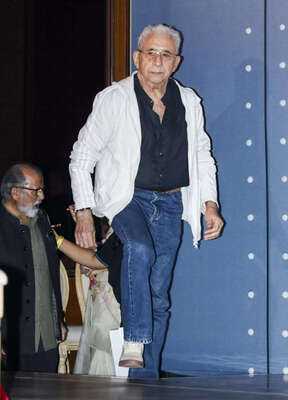 A Controversial Facebook Post
A Controversial Facebook Post
Sometimes, a simple online comment resonates deeply—not due to its shock value, but because it rings true. This was the case when veteran actor Naseeruddin Shah expressed his support for singer-actor Diljit Dosanjh. What ensued was more than just typical online drama; it evolved into a compelling discussion about digital censorship, national sentiments, and the complexities of artistic expression in the digital era.
Shah's message was concise yet impactful. He defended Diljit against the backlash for casting Pakistani actress Hania Aamir in his upcoming film. Without holding back, Shah affirmed the artist's right to collaborate with anyone he chooses, while subtly criticizing the nationalistic outrage. He concluded with a provocative remark, suggesting that those offended should 'go to Kailasa,' a tongue-in-cheek reference to a fictional realm created by a controversial figure.
However, shortly after posting, Shah's message vanished. Contrary to assumptions, he clarified that he did not delete it; Facebook removed it. His reaction was nonchalant, stating, 'I haven’t deleted anything and I don’t care about the backlash.' This incident highlighted a larger issue: a platform's decision to remove content, public reactions, and an artist's refusal to back down.
Instead of reposting or engaging in a lengthy debate, Shah opted for a more subtle approach. He returned to Facebook with a thought-provoking quote: 'It is almost impossible to carry the torch of truth through a crowd without singeing somebody’s beard.' This quiet yet powerful statement resonated, showcasing Shah's ability to communicate effectively without resorting to theatrics.
As expected, reactions poured in from various quarters. Some labeled him 'anti-national,' a term that has lost its significance, while others claimed he had retreated from his original stance. However, those familiar with Shah's career know that retreating is not part of his character.
This situation raises critical questions about online expression. If a post doesn't breach any established guidelines, why is it removed? Was it flagged by automated systems or reported en masse? The ambiguity surrounding content moderation is concerning.
The core issue extends beyond a single Facebook post or film; it reflects a growing unease with cross-border artistic collaborations. The casting of Hania Aamir, a Pakistani actress, alongside Diljit, an Indian, triggered a social media uproar. Yet, art should not be confined by borders or subjected to immigration scrutiny. Shah and many others believe that artistic expression should remain free from such constraints.
Shah is unlikely to apologize, and Diljit will not change his casting choice. Facebook remains silent on the matter. Ultimately, this incident has sparked a vital conversation—one that art is meant to provoke. Disagreement with Shah or the film is acceptable, but if we reach a point where honest expression is quietly suppressed, we face far more significant issues than casting decisions.